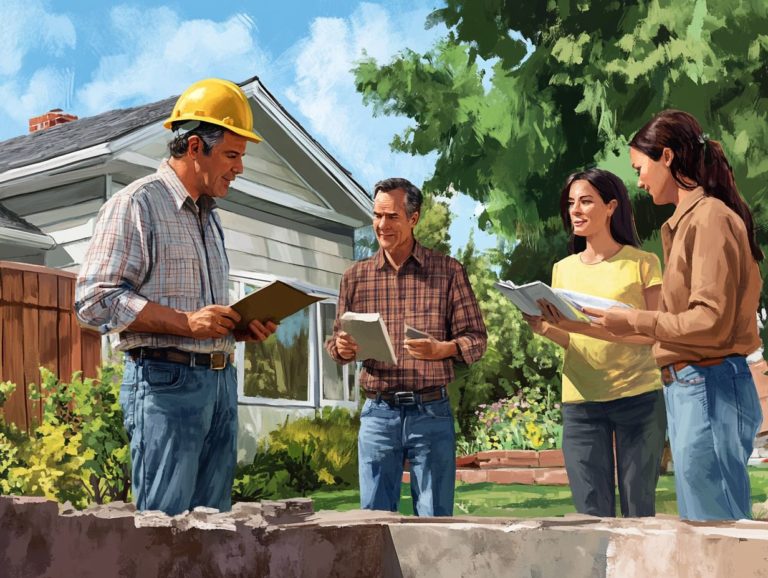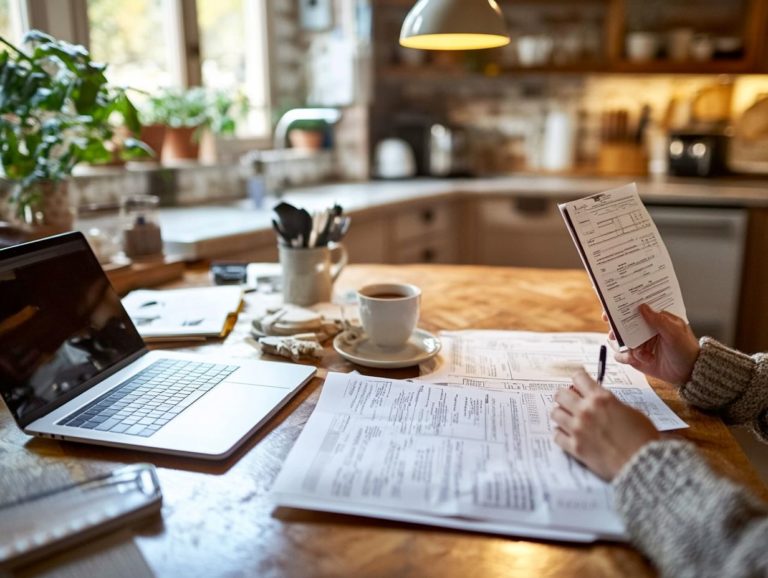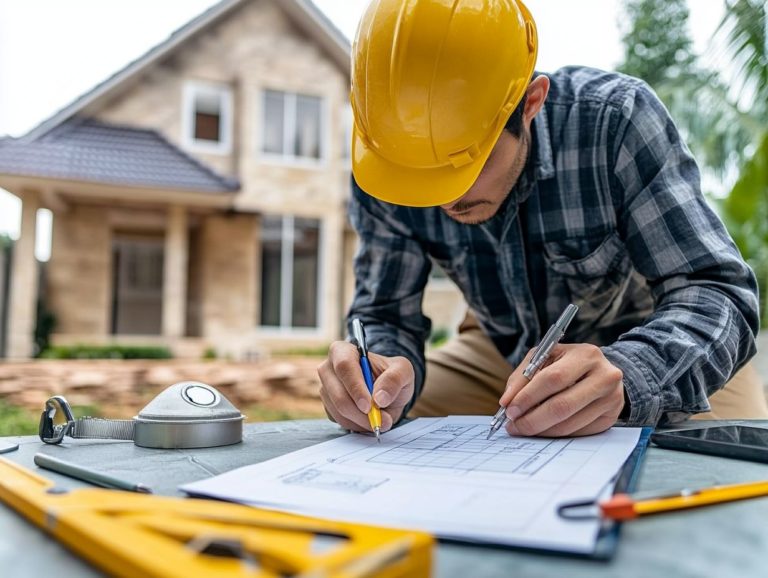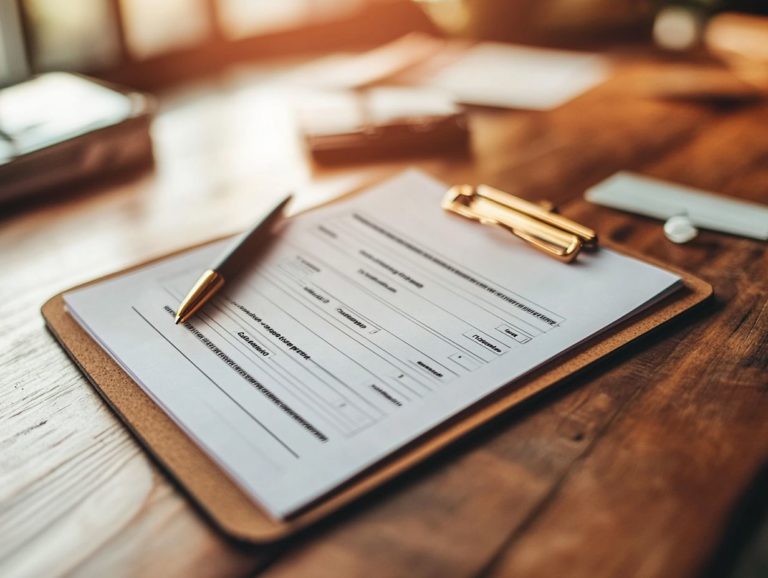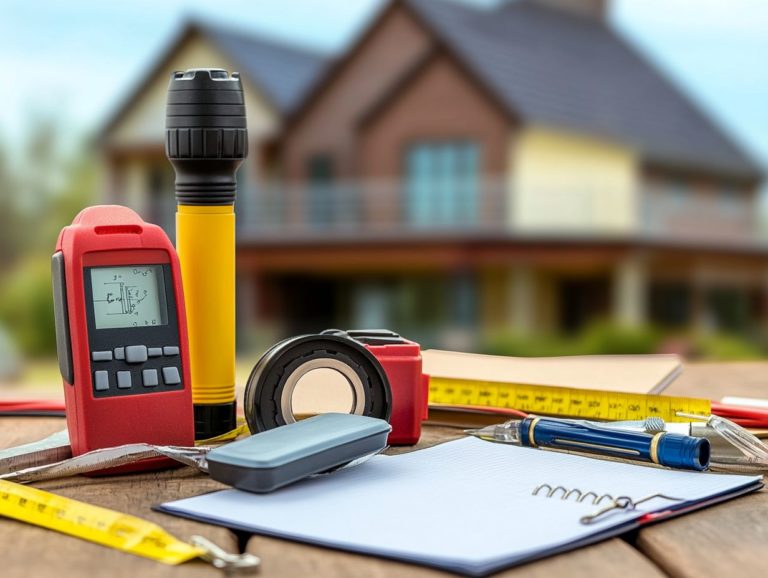The Importance of Home Inspections in Real Estate
Buying or selling a home stands as one of the most significant financial decisions you will encounter, and a home inspection is pivotal in that journey.
By conducting a thorough evaluation of a property, you can uncover potential issues that may not be immediately apparent.
This article delves into what a home inspection involves, its importance for both buyers and sellers, common problems to be aware of, and guidance on selecting the right inspector.
Whether you re embarking on your first home purchase or parting with a long-time residence, grasping the intricacies of home inspections empowers you to make informed decisions.
Contents
- Key Takeaways:
- What is a Home Inspection?
- Why Home Inspections are Important in Real Estate
- What to Expect During a Home Inspection
- Common Issues Found During Home Inspections
- Choosing the Right Home Inspector: Your Key to Success!
- Factors to Consider and Questions to Ask
- Costs and Timing of Home Inspections
- Negotiating Repairs After a Home Inspection
- Frequently Asked Questions
- What is the Importance of Home Inspections in Real Estate?
- Who is Responsible for Arranging a Home Inspection?
- What is Included in a Home Inspection Report?
- Why is it Important for Buyers to Attend the Home Inspection?
- Can Home Inspections be Used as a Negotiating Tool?
- Are There Benefits for Sellers in Getting a Home Inspection Before Listing?
Key Takeaways:
- A home inspection is an essential step in the real estate process, providing valuable information on the condition of a property and potential issues.
- Both buyers and sellers can benefit from a home inspection, as it can help with negotiating repairs and avoiding costly surprises.
- When choosing a home inspector, consider factors such as experience, qualifications, and cost.
- It is also important to address any issues found during the inspection and negotiate repairs in a strategic manner.

What is a Home Inspection?
A home inspection represents an essential milestone in the real estate journey, as it carefully checks the condition of a property to uncover potential issues that could pose safety risks or result in expensive repairs. Understanding the importance of home inspections in real estate transactions can help buyers make informed decisions.
This comprehensive evaluation encompasses a range of systems and components, including HVAC (heating, ventilation, and air conditioning), plumbing, electrical systems, roofing, and foundation integrity, offering insights for both buyers and sellers.
Conducted by a qualified home inspector, the inspection ends with a detailed report of findings and recommendations. This enables you, as a first-time homebuyer, to make well-informed decisions regarding your property investment.
Definition and Purpose
The definition and purpose of a home inspection revolve around offering you a comprehensive evaluation of a property, pinpointing its overall condition and any immediate concerns.
This detailed process serves as a crucial resource for you as a potential buyer, illuminating both visible and hidden issues that might not be obvious during initial showings.
By systematically assessing various elements such as the roof, plumbing, electrical systems, and structural integrity, the inspection provides you with essential information about the property’s current state and any maintenance requirements.
As a result, the thorough report generated delivers invaluable insights, helping you make informed decisions and steering clear of costly renovations or unexpected repairs in the future.
Ultimately, a well-executed inspection can bolster your negotiating power, highlighting the importance of thorough home inspections and ensuring you secure a fair deal in your home-buying journey.
Why Home Inspections are Important in Real Estate
Home inspections are a game-changer in real estate! They offer vital insights that significantly impact your decisions as a buyer and highlight the importance of home inspections in real estate deals, helping to minimize any potential regrets.
By revealing hidden issues like foundation problems, electrical faults, or pest infestations, you can approach your options with increased confidence, ensuring that you make well-informed choices about your investment.
A comprehensive inspection opens up negotiation opportunities, helping you negotiate repairs or changes in the property price.
Ultimately, securing buyer protections through an inspection contingency not only safeguards your investment but also paves the way for a smoother transaction.
Benefits for Buyers and Sellers
The advantages of home inspections are significant for both buyers and sellers, highlighting the importance of home inspections in real estate and fostering a more transparent and equitable transaction.
As a buyer, a comprehensive inspection reveals potential issues that might escape notice during a casual walkthrough. This knowledge equips you with valuable insights, enhancing your purchasing decisions.
It not only enhances your negotiating power but also helps you avoid unexpected repair costs in the future, safeguarding your investment.
On the other hand, as a seller, you can leverage home inspections by proactively addressing any issues before listing your property. This approach boosts your property s market value and paves the way for a smoother negotiation process.
Buyers are far more likely to be swayed by a well-maintained home.
Ultimately, embracing this due diligence cultivates trust and satisfaction for everyone involved in the transaction.
What to Expect During a Home Inspection

Understanding what to expect during a home inspection can significantly reduce anxiety for you as a first-time homebuyer. It prepares you for the entire process.
Typically, a professional home inspector will carry out a thorough assessment of the property. They adhere to a standardized checklist that addresses key areas such as HVAC systems, plumbing, electrical systems, and the overall structural integrity of the home.
You ll have the opportunity to accompany the inspector. This allows you to gain firsthand insights into the inspection s findings and the condition of crucial components like the roofing and foundation.
This collaborative approach ensures that you are well-informed about the state of the property, enabling you to make confident decisions.
The Process and What is Included
The home inspection process is a careful check of a property. It gives you a clear understanding of its condition.
This thorough assessment typically kicks off with a comprehensive walkthrough. It focuses on critical areas like the roof, foundation, and exterior conditions.
An inspector will create a detailed checklist. They evaluate essential systems such as:
- HVAC for efficiency
- Plumbing for leaks or drainage issues
- Electrical systems to ensure both safety and functionality
Inspectors also check safety features. This includes smoke detectors and carbon monoxide alarms to ensure they meet current standards.
Each of these elements is crucial in determining the overall integrity and livability of the home. This helps you make informed decisions and prioritize any necessary repairs.
Common Issues Found During Home Inspections
Home inspections frequently reveal a range of common issues that can profoundly impact both the safety and value of a property. Understanding the importance of a home inspection for buyers is vital! It can save you money and stress.
You might encounter structural concerns, such as foundation problems, along with safety risks like inadequate smoke detectors. Electrical issues could also pose potential fire hazards.
Plumbing systems may show leaks or old parts, while mold detection and pest infestations think termites or rodents can complicate your home buying journey.
Spotting these issues early can save you from expensive repairs and enable you to craft more effective negotiation strategies.
Structural, Electrical, and Plumbing Problems
During a home inspection, you should focus on critical areas like structural integrity, electrical systems, and plumbing. These are essential in identifying potential hazards and necessary repairs.
These elements often uncover significant concerns that could jeopardize safety and diminish the property s value. For example, structural issues like foundation cracks or damaged joists can lead to serious stability problems, putting the very integrity of your home at risk.
Electrical problems, such as outdated wiring or overloaded circuits, are not just inconvenient; they pose fire hazards that threaten not only the occupants but also the home s market appeal.
Similarly, plumbing issues think leaks, corrosion, or faulty fixtures can lead to extensive water damage and mold growth. This could result in costly repairs and health concerns.
Proactively addressing these issues is crucial for maintaining safety and ensuring the long-term value of your property.
Choosing the Right Home Inspector: Your Key to Success!
Selecting a reliable home inspector is a crucial step for you as a homebuyer. Understanding the role of home inspections in real estate transactions can significantly influence your decisions and the overall success of your property transaction.
When evaluating potential inspectors, consider their qualifications and certifications from esteemed organizations like the American Society of Home Inspectors or the International Association of Certified Home Inspectors. Also, take into account their experience in the field.
It s wise to prepare a list of pertinent questions to ask during the selection process. This ensures you cover all aspects of the home inspection and gain valuable insight into the inspector’s approach and thoroughness.
Factors to Consider and Questions to Ask

When you re selecting a home inspector, there are several crucial factors to consider. Specific questions can help you gauge their expertise and reliability.
Prioritize the inspector s credentials. Look for licenses and memberships in professional groups, as these indicate their commitment to industry standards. Experience is also key. Take the time to understand how many homes they ve inspected in the past and what types of properties they specialize in.
Ask about their methods! This helps you understand how thorough they are. Questions like, What is your process for identifying issues? or Can you share an example of a significant problem you discovered during an inspection? offer valuable insight into their thoroughness and attention to detail.
Costs and Timing of Home Inspections
Understanding the costs and timing related to home inspections is vital for budgeting effectively and planning your property purchase timeline.
The price of a home inspection can fluctuate based on several factors, such as the property’s size, location, and the complexity of the inspection process. Generally, home inspections range from a few hundred to over a thousand dollars, depending on these variables.
Schedule an inspection promptly after your offer is accepted. This ensures you have ample time for repairs and negotiations based on the inspector’s findings, including any necessary repair estimates.
Factors That Affect Cost and Typical Timeframe
Several factors influence the costs and timing of your home inspection. It s crucial to grasp these elements before moving forward.
Your geographic location plays a significant role, as inspection fees can vary dramatically from one region to another; urban areas often command higher rates due to increased demand.
The size of the property directly impacts the cost. Larger homes necessitate more extensive evaluations, leading to higher fees. You might also want to consider optional testing for issues like mold or radon, as these can add to your overall expenses.
Typically, scheduling inspections can take anywhere from a few days to a week, depending on availability. The inspection process usually lasts several hours. These timeframes can directly influence your buying timeline, especially if repairs are needed after the inspection.
Negotiating Repairs After a Home Inspection
Negotiating repairs after a home inspection is a vital step in your home buying journey. It can shape the final terms of the sale and safeguard your investment.
Once you receive the inspection report, you gain significant leverage. Use it to pinpoint critical issues that warrant attention think electrical problems or structural deficiencies.
This is the perfect moment to dive into negotiations with the seller. Discuss necessary repairs and adjustments to the property’s value, ensuring both parties arrive at a fair agreement.
Communicate clearly and understand the findings to strengthen your negotiation. Proper communication is essential for facilitating a successful negotiation process.
Strategies for Addressing Issues and Requesting Repairs
When you encounter issues highlighted during a home inspection, having well-defined strategies for requesting repairs can significantly boost your negotiating power.
It’s crucial to recognize the importance of prioritizing critical issues; urgent structural or safety concerns should always take precedence over minor cosmetic matters.
Presenting repair estimates from reputable contractors provides a solid foundation for your discussions. It also showcases your seriousness and consideration in the request.
Additionally, frame your requests to promote collaboration with the sellers. Rather than simply listing demands, approach the conversation with potential solutions or compromises in mind. This creates a sense of partnership.
This collaborative approach not only helps maintain goodwill but can also lead to more favorable outcomes throughout the negotiation process.
Frequently Asked Questions
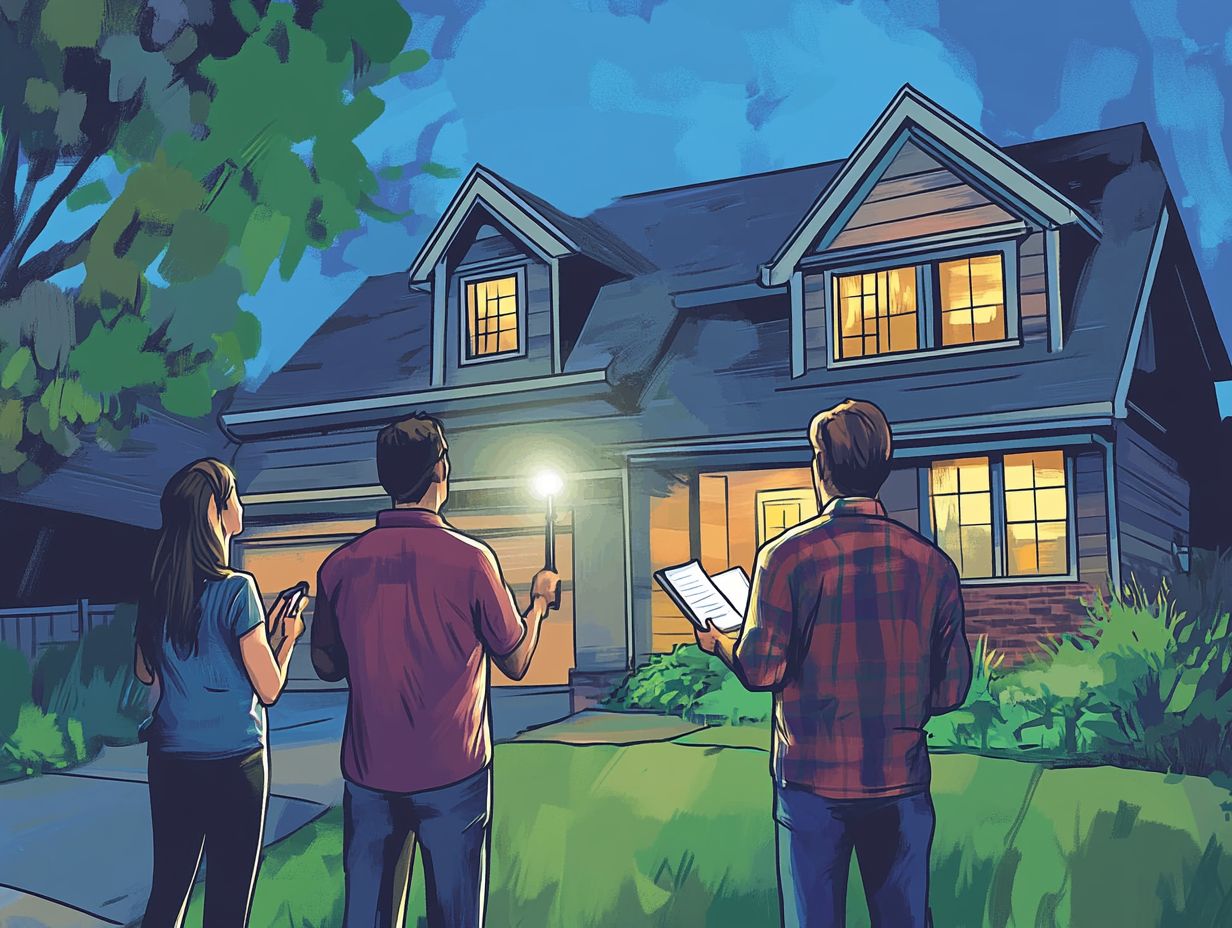
What is the Importance of Home Inspections in Real Estate?
Home inspections are crucial for buyers, as they provide vital information about the property’s condition and highlight the key role of home inspections in real estate.
Who is Responsible for Arranging a Home Inspection?
The buyer typically arranges the home inspection. However, it can be negotiated to be the seller’s responsibility.
What is Included in a Home Inspection Report?
A home inspection report gives a thorough check of the property. It highlights any issues or repairs needed.
Why is it Important for Buyers to Attend the Home Inspection?
Buyers should attend the inspection to ask questions. This helps them understand the property better and note any issues.
Can Home Inspections be Used as a Negotiating Tool?
Yes, they are a powerful negotiating tool. Buyers can ask sellers to fix issues or lower the sale price if problems are found.
Are There Benefits for Sellers in Getting a Home Inspection Before Listing?
Absolutely! A pre-listing inspection helps sellers fix issues in advance. This increases the chances of a smooth sale and builds trust with potential buyers.

